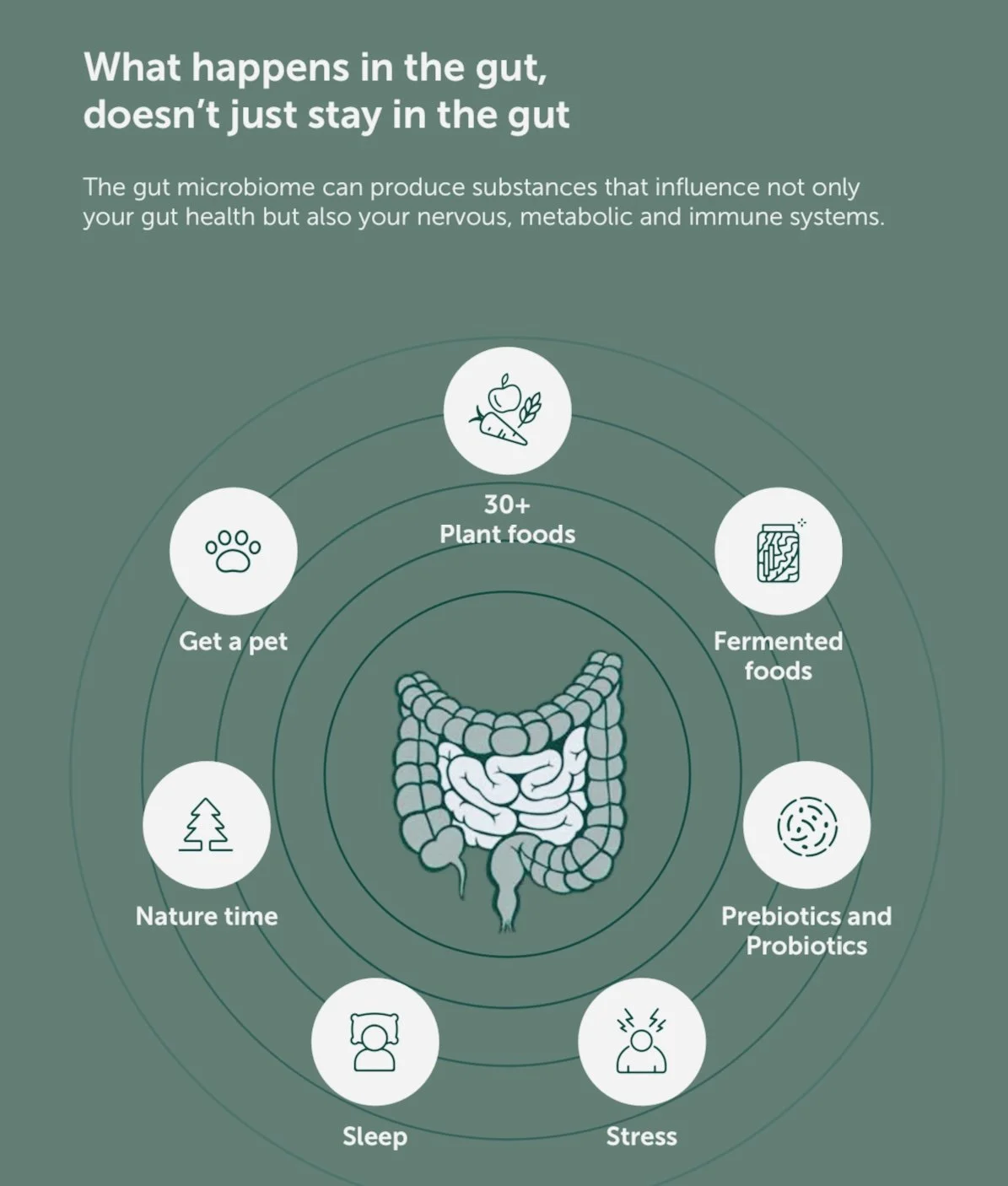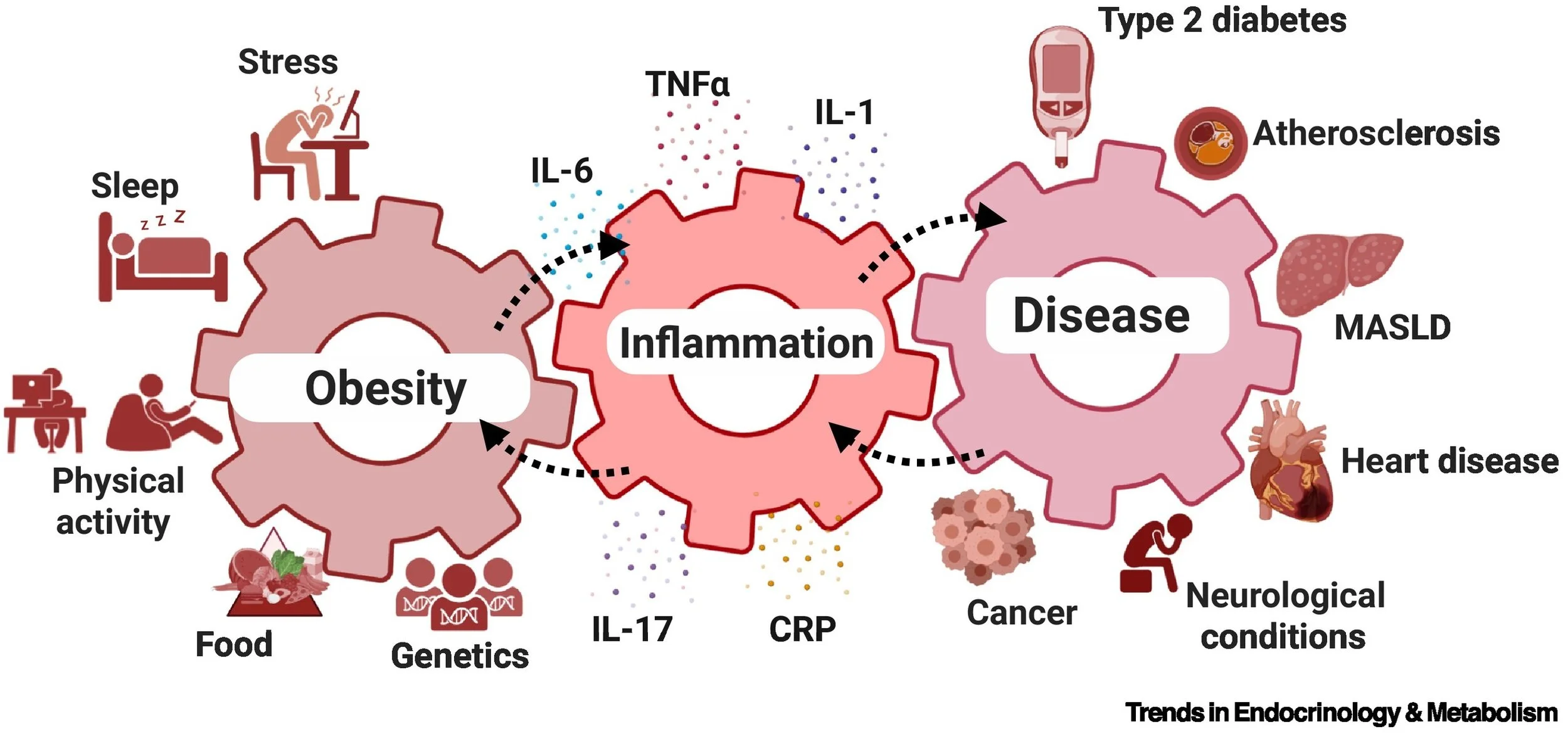The Diet Trap - Why Dieting May Lead to Weight Gain (not Loss)
Diets are an emotional trap.
They promise quick results but often lead to weight gain and frustration.
I thought I would review and share the best evidence to back these claims.
Lasting health comes from steady enjoyable and sustainable lifestyle changes and the more we understand the microbiome and GLP-1 your endogenous weight loss peptide, the more we realise it has a potential large role to play.
GLP-1 stands for Glucogon Like Peptide-1, a naturally produced hormone. In it’s natural form the body releases this peptide in the gut mostly AFTER eating and it signals the brain that you are full and slows down stomach emptying and reduces appetite signals.
The GLP-1 agonist drugs like “Ozempic” and “Wegovi” synthetically mimic this peptide and have been very effective for diabetics.
GLP-1 plays a key role in :
regulating blood sugar and insulin secretion
reducing appetite and emotional eating
improving satiety
increasing weight loss
reducing fatty liver storage
Contrary to popular theory, the GLP-1 agonists do not block fat absorption in the Gut.
Excess fat tissue is inflammatory tissue
Weight optimisation is never about “fat shaming”. Excess adipose tissue is pro inflammatory. This is well illustrated by the following diagram. (trends in Endocrinology and Metabolism)
Obesity has the potential to be a combustable engine of ongoing inflammation within your body and for many can play into multiple disease processes, neurological, cardiac, metabolic, cancers.
Eat less move more…. but what if the science shows the opposite? !
For decades, we’ve been told that dieting is the answer to controlling weight. Significant industry has been created around this belief so there are strong vested interests in trying to maintain it.
Two major research reviews suggest that dieting is not only ineffective for long-term weight loss, but may even predict future weight gain.
So what does the Research show ?
1. Dieting Predicts Weight Gain
A review of 25 long-term studies found:
75% of studies showed that people who reported dieting were more likely to gain weight over time.
“Restrained eating” (being generally much more mindful and educated about food) did not predict weight gain.
Dieting might signal an underlying tendency toward weight gain — and short-term restriction fails to prevent it.
2. Diets Rarely Lead to Lasting Weight Loss
Another landmark review (Mann et al., 2007, American Psychologist) examined randomized trials and long-term observational studies of diets:
Short-term success, long-term failure:
Most people lose 5–10% of body weight in the first 6 months.
Regain is the rule:
Within 4–5 years, most (if not all) weight is regained, and up to two-thirds end up heavier than before they started dieting, a demoralising outcome.
No consistent health benefits:
Diets did not reliably improve blood pressure, cholesterol, or overall health in the long run.
❌ The Dieting Dilemma
Why do diets fail?
Dieting triggers the body’s natural defenses to:
slow metabolism and slow fat burn
increase hunger hormones
stronger cravings
increased fat to muscle ratios
Many diets are overly restrictive, leading to cycles of deprivation and overeating (“yo-yo dieting”) and nutrient depletion.
Diets intuitively make you feel like you are “going without” and who wants that long term ?
Weight regain often shifts body composition toward more fat and less muscle, making it harder to keep weight off.
✅ Better Paths to Health
Numerous studies highlight that dieting is not the solution.
Instead:
Focus on habits, not restriction:
have a plan encompassing non judgmental and knowledgable support
Regular movement, enjoy it and you will do it more often
balanced eating, again this needs to be individualised and not one size fits all
enough sleep supports healthier food choices and greater long-term health.
Mindful eating works better than dieting: Paying attention to hunger, signals of fullness and food quality. Insight into your relationship with food can help stabilize weight.
Prevention matters most: Once significant weight is gained, the body strongly resists losing it.
Early and consistent healthy habits are the best defense.
A healthy gut, with a balanced biome makes GLP-1 to naturally support a sustainable weight.
Consider addressing first the “Why” behind your weight gain ? and explore more targeted and sustainable alternatives.
There is no one mass market program that is suitable for all. Remember, a body with issues with tissue toxin burden or difficulty with insulin signalling….will hold onto FAT !
Your Key Takeaways
✨ Dieting often predicts future weight gain, not loss.
✨ Restrained eating (mindful moderation) isn’t harmful and may help, this includes time restricted eating for some people..to discuss and explore.
✨ Diets do not provide lasting health benefits, for some malnourished obesity.
✨ Sustainable lifestyle habits — not restrictive dieting — are the best way to protect your health.
✨ Optimising your microbiome health supports healthy weight management and your overall preventative health. Your microbial ecosystem has powerful contribution and clinical implication.
and lastly but certainly not least:
✨ Create a clear vision of your best self… engage support and go for it !
A proud snap of a healthy family refrigerator after a visit to the local organic market
Obesity is not a normal part of aging.
I help my patients change this limiting belief.
Providing guidance on botanicals and foods that can shift biology to support a healthier weight.
Shifting relationships and knowledge around food, boosting metabolism, enhancing lives.
References
Lowe, M. R., Doshi, S. D., Katterman, S. N., & Feig, E. H. (2013). Dieting and restrained eating as prospective predictors of weight gain. Frontiers in Psychology, 4:577. doi: 10.3389/fpsyg.2013.00577
Mann, T., Tomiyama, A. J., Westling, E., Lew, A.-M., Samuels, B., & Chatman, J. (2007). Medicare’s search for effective obesity treatments: Diets are not the answer. American Psychologist, 62(3), 220–233. doi: 10.1037/0003-066X.62.3.220
Clinical Applications of Scientific Innovation : Nutrition notes GLP-1. August 19, 2025.







